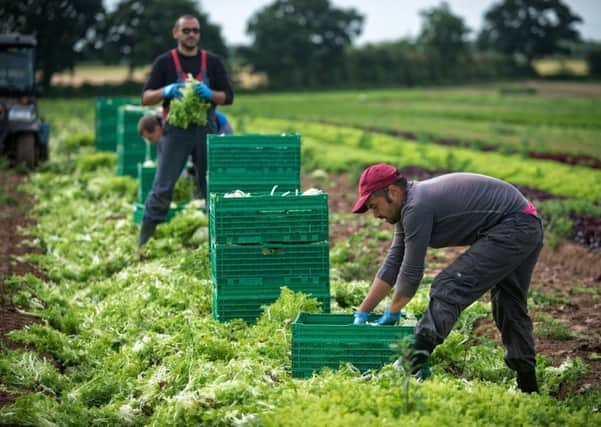Retailers urged to drive greater British food self-sufficiency


A study, spearheaded by leading expert on global food issues, Professor Tim Benton from the University of Leeds, calls on British retailers to boost local UK food making and production to reduce food miles and support local businesses and countryside.
The warning comes after consumers face vast increases in the price of day-to-day goods such as fish and vegetables owing to weather and labour issues around Europe.
Advertisement
Hide AdAdvertisement
Hide AdThe delicacy of Britain’s supply chain has been exposed by recent bad weather in Italy and Spain which has been blamed by retailers for stock shortages of courgettes and spinach. Iceberg lettuce has also been rationed by some chains.
Prof Benton and his team of academics, including colleagues at York University, believes there are both environmental and economic advantages to Britain producing more, and more diverse, food.
“The UK can never - and should not aim to be self-sufficient in food production. However, it makes sense to hedge our bets and build a more resilient system, by stimulating, incentivising, protecting and growing our local production economy to provide more food, and more diverse food, to the nation,” their report states.
Increasing British food production would particularly protect family and small-scale farming, the academics say, and doing so would stimulate better environmental diversity and production innovation such as local cheese and ice cream making which would in turn be supplied to farmers markets, restaurants and retailers.
Advertisement
Hide AdAdvertisement
Hide AdThe report continues: “The future of the UK’s agri-food sector, and our rural economy and landscapes, is better placed if we have a greater diversity of products produced, and sold, in a diversity of ways.
“Our vision is for a modern, diverse and innovative agri-food sector. It is not a vision of warm beer, village greens and rural idylls.”
In order to realise great self-sufficiency, British farmers are urged to embrace technology, compete as businesses, share best practice and recognise current practices are often not sustainable.
Likewise, the current approach of food processors and retailers is “risky” and they must help drive innovation across the food chain and reward suppliers who grasp the opportunity.
Advertisement
Hide AdAdvertisement
Hide AdThe report is published on the same day that Morrisons announced that it was to begin increasing the amount of British produce it sources.
The Bradford-based supermarket chain is hosting a series of proactive drives across the food sector to add more domestic suppliers, starting in Yorkshire next month.
Morrisons said it was keen to uncover “those hidden Yorkshire gems” that fit in with what local people want to eat and drink and that are grown or made “just down the road” from their communities.
Mark Collings, Morrisons regional manager for Yorkshire, said: “Our customers tell us they want to see even more food that is made in God’s own county and that’s why we’re asking the best suppliers to get in touch.”
Advertisement
Hide AdAdvertisement
Hide AdBuyers for the retailer will be inviting what they judge to be the best local suppliers to showcase their products at an event in Keighley on March 14. Successful producers will then have the opportunity to be listed in Morrisons stores.
The supermarket will be working with members of the Yorkshire WI, using their local knowledge and expertise to source and select the best suppliers in their area.